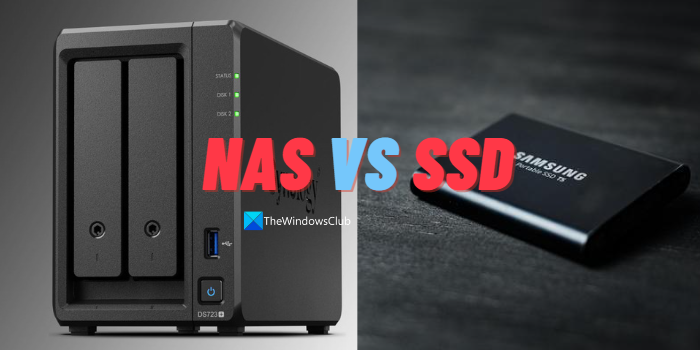Digital data is continuously growing every day. There arises the question of efficient storage solutions to store that data. There are two different kinds of storage solutions that we can use – Network Attached Storage (NAS) and Solid State Drives (SSD). They both have the same storage functions but different in unique ways. In this guide, we explain what NAS hard drive and SSD drive are, the difference between NAS hard drive and SSD, and which is the best choice and why.

What is NAS hard drive?
Network Attached Storage (NAS) refers to a type of storage that provides file storage and access to multiple users and devices over the network. NAS is designed to be easily accessible to multiple users and devices easily. It can be used for various purposes, including data backups, file sharing, media streaming, and remote access.
NAS devices consist of one or more hard drives. It comes with its own network interface and operating system for management. They can be connected to a local area network (LAN) via Ethernet or Wi-Fi. NAS offers a convenient and flexible solution to store and share data on a connected network.
What is SSD?
Solid State Drive (SSD) is a storage device that uses NAND-based flash memory. Traditional hard drives use spinning disks and magnetic heads to read and write data, but SSD does not have moving parts. They solely rely on electronic circuits to access and store data. For the same reason, SSDs are faster, more reliable, and more energy-efficient.
SSDs are available in different capacities, ranging from 100GB to multiple terabytes. They are used for a wide range of applications for their performance over traditional hard drives.
NAS hard drive vs SSD; Which is the best choice & why?
NAS hard drives and SSD are different in many ways. They differ majorly in the following aspects.
- Technology
- Speed
- Reliability
- Price
- Capacity
- Power consumption
Let’s get into the details of each one.
1] Technology
The primary difference between NAS hard drives and SSD is the use of technology to store data. NAS hard drives come with spinning magnetic disks to read and write data. Whereas SSDs use non-volatile flash memory chips. The speed of a NAS hard drive depends on the rotation speed of the disk and the speed of the read or write head in it.
SSD does not have that issue as it contains no moving parts in it. The flash memory chips in the SSDs make them fast over the traditional hard drives. The technological difference between them makes them two different poles in storage.
2] Speed
When we compare the speeds of a NAS hard drive and an SSD, obviously SSD wins over the other due to its technological difference that involves no movable parts. The read and write speeds between them would not match as SSDs can access data much faster than NAS hard drives.
3] Reliability
NAS hard drives are made of traditional hard disks which involve moving parts in it to read and write data. They are more prone to failure even with the slightest mishandling. SSDs on the other hand are far more reliable in the long term as there is little scope for mechanical failure. Unless the flash memory is broken or damaged, you can use SSDs for a very long time.
4] Price
NAS setup costs more in the beginning, but increasing the capacity with hard drives over time does not match the pricing of SSDs in the market. For the speeds and other features of SSDs, they are pricier than the traditional hard drives which have been in the market for a longer time.
5] Capacity
SSDs are available from hundreds of gigabytes to terabytes. Even NAS hard drives are expandable by adding new hard drives to the setup. In the aspect of capacity, NAS hard drives win over SSDs. A lot of data can be stored on NAS hard drives because of the number of hard drives it supports.
6] Power consumption
As said earlier, SSDs do not contain any moving parts in their physical device, unlike NAS hard drives. So, they consume less power compared to NAS hard drives.
These are the major differences between NAS hard drives and SSD.
Conclusion
If you want to store data and do not want to give access to anyone, SSD is best for you. If you run a business that involves data storage, and sharing over multiple users, you need NAS hard drives. Now, it is also possible to install SSDs in NAS devices to get the speeds of SSDs over the network.
Read: How to check SSD Lifespan on your Windows computer
Is SSD necessary for NAS?
That depends on your choice as you can install both HDDs and SSDs on a NAS setup. Installing an SSD or HDD depends primarily on your budget and the kind of data you share on the network.
Are NAS hard drives better?
NAS hard drives are better to store data and share it over a network with multiple users and devices. You can make it even speeder by using SSDs in the NAS setup by replacing the traditional hard drives.
Related read: Fix Slow SSD Read Or Write Speed On Windows.